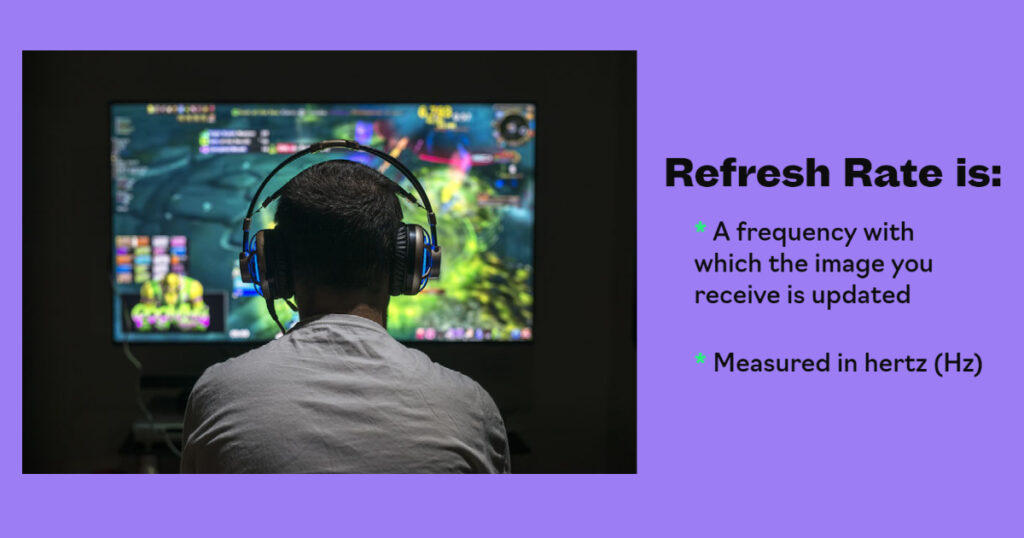Are you looking for a new laptop or desktop? If so, you have probably come across the term “screen refresh rate” before. The refresh rate is one of the most important aspects of a PC monitor or laptop screen.

But what exactly is the screen refresh rate? And most importantly, should you invest in a laptop with a premium screen that supports high refresh rates?
Let us answer these questions and make your choice easier.
What is Screen Refresh Rate?
To make a long story short: The refresh rate of a screen has everything to do with the frequency with which the image you receive is updated. In other words, the higher the refresh rate, the more often your screen is updated per second.
This value is measured in hertz (Hz). For example, if a laptop is equipped with a screen that supports a refresh rate of 60 Hz, the image you get from the screen is updated 60 times every second.
Some of the best screens on the market offer 144Hz and 244Hz. It becomes clear that a 244Hz screen updates the image four times more in one second than a standard 60Hz monitor. With a top-notch CPU and a dedicated graphics card, a high-end 144Hz screen can provide an advanced gaming experience.
Contrary to what many believe, the refresh rate is a completely different value than frames per second (FPS). Let us find out why.
Is Screen Refresh Rate the Same with Frames Per Second (FPS)?
As mentioned earlier, there is a difference between refresh rates and FPS. First, your display’s refresh rate is measured in Hz. On the other hand, the FPS is a different value that is more a function of the computer’s overall performance
In other words, even if a monitor supports 144 Hz per second, it does not automatically mean that your computer will also deliver 144 frames per second. The FPS is also affected by the performance of your GPU and CPU.
So, if your GPU cannot provide more than 60 FPS, your monitor is limited to that (smaller) value.
Can a High Refresh Rate Display Improve your Gaming Experience?
High frame rates are important for professional and beginner gamers in most cases. The reason is simple. Advanced software and demanding games require a higher refresh rate than simple tasks like browsing or streaming.
You may be wondering what is the best screen refresh rate for gaming. As mentioned earlier, your gaming experience is affected by more than just the refresh rate alone. For this reason, a 144 Hz screen should be accompanied by a strong GPU and a capable multi-core CPU.
For example, the Alienware x17 R2 we recently reviewed, features a 360 Hz refresh rate, an NVIDIA RTX 3060 (GPU), and the latest i9-12900HK (CPU). This build offers one of the best gaming experiences on the market.
Indeed, such a powerful CPU and GPU can handle high screen refresh rates and this laptop will deliver top-notch FPS (100+), even in the most demanding games
So, your screen refresh rate is important in improving your FPS and, thus your gameplay. But it has to be framed by other hardware components that support the maximum Hz.
Why is Screen Refresh Rate Important?
As touched on above, the refresh rate of your screen is one of the best ways to improve your FPS. Gamers are the most important category affected by the FPS. This is especially true for professional and competitive gamers who spend many hours playing first-person shooter games like Apex Legends and Pubg.
The difference between a 60Hz monitor and Alienware’s 360Hz screen is enormous. Even novice gamers will notice a big difference in the amount of visual information they receive per second. For shooter and RPG games, this results in much smoother gameplay.
In addition, high-end monitors can actively reduce the input lag caused by your internet connection. It becomes clear that the screen refresh rate is an aspect that every gamer should consider before buying a new computer
As long as a high refresh rate monitor is paired with powerful hardware, such a monitor can really take a gamer to the next level. But is a high refresh rate monitor worth the investment? And how big is the difference between a 360Hz and a 144Hz screen, anyway?
Do High Screen Refresh Rate Monitors and Laptops Worth the Investment?
The truth is that most gaming laptops are equipped with high-end displays. After all, a display’s quality and refresh rate play an important role in the overall experience a device can provide.
The good thing about premium gaming laptops is that they usually maintain their value at a high level. In fact, the resale value of a gaming laptop depends not only on its hardware specifications but also on the number of Hz its display can deliver per second.
More precisely, you can always sell a gaming laptop for cash online. Depending on the CPU, GPU, RAM, and screen quality of your device, you can quickly get an estimate of its current value. Gadget Salvation offers one of the fastest processes when it comes to repurposing used technology.
When buying a new (or used) gaming laptop, the screen refresh rate can also play an important role. If you are a professional or highly competitive gamer, you’ll want to opt for a premium screen (144Hz or higher). On the other hand, a 144Hz display is more than sufficient for most casual gamers.
Wrap-Up
It becomes clear that the screen refresh rate is very important for gamers. But you must remember that this value is not the only aspect affecting your FPS. Fortunately, most gaming laptops on the market, even the budget ones, come equipped with powerful hardware that can handle the high refresh rate of a gaming screen.
If you need a gaming laptop but do not want to spend a fortune, you can always buy a used computer through our website. We will be happy to help you find a laptop that suits your needs and preferences.










